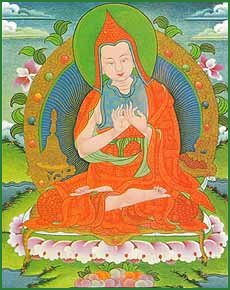The Great Chariot
by Longchenpa | 268,580 words
A Commentary on Great Perfection: The Nature of Mind, Easer of Weariness In Sanskrit the title is ‘Mahāsandhi-cittā-visranta-vṛtti-mahāratha-nāma’. In Tibetan ‘rDzogs pa chen po sems nyid ngal gso’i shing rta chen po shes bya ba ’...
Part 9 - All is impermanent and must be left behind
Moreover, as for thinking of impermanence; because, having left everything behind, we must depart:
Retinue and attendants, pleasures, friends and relatives,
Youth and beauty, along with power and social rank—
We have to leave alone, abandoning them all,
Followed by black and white karma, until they both are emptied.
Then there is no refuge other than the Dharma.
Why should we not exert ourselves to go beyond them?
At the time of death, none of the appearances of this life will be of any use to us. It is taught that only the Dharma is a refuge from the execution of the karma of our virtue and vice. Regarding this the Sutra of Instructions to the King says:
The time approaches when the king will go,
Your cherished pleasures, friends and relatives
Will not follow where you must go then.
As for kings, wherever they may* go,
Karma follows after like a shadow.
*= May stay or go. Omitted for metrical reasons.
The Sutra requested by Shriidatta[1](dpal sbyin zhus pa’i mdo), says
Because of a mixture of karmas we are made to seek enjoyments.
We are also made to take care of our children and spouses;
But at the time of death, when there is great suffering,
Those children and spouses will not serve us as a refuge.As the various karmas performed by us are received,
Our children as well as spouses will be left behind
We alone will come to experience suffering.
When the time for that has come, they will not share our lot.Our beloved parents, siblings, children, and spouses,
Our servants, wealth, and crowds of friends and relatives,
Will not travel with us, when we go to death.
Karmas will be our only children at that time.
At that time, those who have gathered powerful bad karma will seem to be surrounded by those whom they have killed. The minions of the Lord of Death will seem to lead them away with a noose. The Bodhicaryavatara says:
If this is the day when a man is being led
To a place where he will have a limb cut off,
With dry mouth, blood-shot eyes, and such,
He seems quite otherwise than he was formerly.When the utterly terrifying messengers of the Lord of Death
Having a form of flesh, seize us bodily,
How badly will we be stricken with the illness of great fear?
What need is there to say how terrible that will be?Who is the good sage that can be our guardian,
One who is able to guard us from such frights as these?
Our flesh will crawl with panic, and with staring eyes,
We shall search for protectors in the four directions.Seeing that in the four directions there are none,
We shall be enveloped in complete despair.
Then it will be too late to think about Dharma. We will be like criminals looking for a refuge as they are given into the hands of their executioners. From now on we had better remember that. The same text says:
Even if we truly abandon laziness,
Then it is too late. Then what can we do?
After the Lord of Death has suddenly appeared,
We shall think, "Oh no! All is surely lost."
However, the three jewels and the virtue of Dharma will be a refuge. The Sutra requested by Dri ma med par byin pa says:
Except for these beings, who are possessors of virtue,
Even our fathers and mothers can be no refuge for us,
Neither can a host of friends, or wealth and youth.
All such refuges will sink into cyclic existence.We should give over our bodies joyfully to the buddhas,
And likewise entrust to them our lives and our enjoyments.
Other than the three jewels, there is no refuge at all
On which we can rely while we are sentient beings.
Footnotes and references:
[1]:
